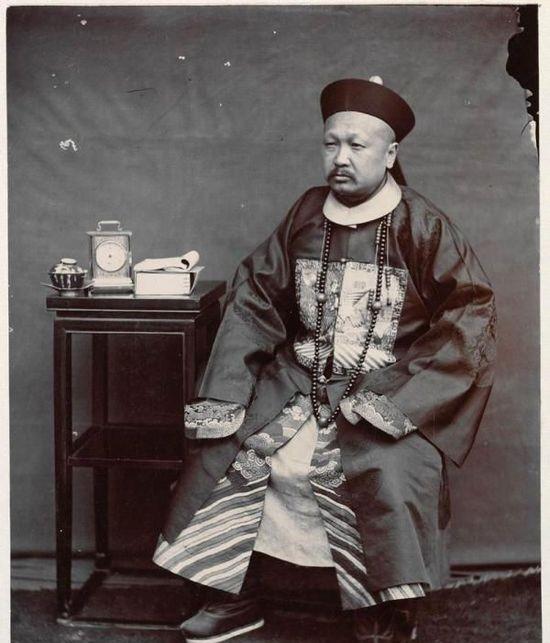In the late Qing Dynasty, there was a well-known official named Cen Chunxuan. Cen Chunxuan has a nickname, called "Guan Tu".
Why does Cen Chunxuan have this nickname?
This is because Cen Chunxuan dared to "strike hard" at officials who violated the law and discipline.

In July 1902, the Brotherhood Rebellion broke out in Sichuan. The imperial court ordered Cen Chunxuan to serve as the governor of Sichuan and go to Sichuan to "extinguish the fire". After Cen Chunxuan arrived in Sichuan, he found that the root cause of the Brotherhood rebellion was the unscrupulousness of local corrupt officials. He immediately executed a number of corrupt officials, and the Brotherhood rebellion was gradually quelled.
After the pacification of Sichuan, Cen Chunxuan was again appointed governor of Liangguang. During his tenure as governor of Liangguang, Cen Chunxuan punished a number of corrupt officials, and in just 3 years, 1,060 officials of all sizes were impeached and dismissed. The reputation of "official slaughter" has not gone away.
The "National News and Preparation" records that "in every main province of Chunxuan, there will be a great deal of entanglement, and all the chestnuts will lose their color, and those who lose their color will be corrupt officials, and those who are slaughtered by Cen Chunxuan will be corrupt officials, which is the virtue of the people and the virtue of those who slaughter officials." ”
One of the most beautiful things Shum Chunxuan did was to hunt down corrupt officials in Cross-border Macau.
This "unlucky" corrupt official was named Pei Jingfu. Pei Jingfu was a jinshi in 1886 and successively served as the commander of Lufeng, Panyu, Chaoyang and Nanhai Counties in Guangdong. In September 1903, not long after Cen Chunxuan became the governor of Liangguang, he impeached Pei Jingfu to the imperial court, saying: "Pei Jingfu of Zhixian County, Nanhai County, according to the gentlemen's control, has a case. It means accusing Bae Ofe of asking for money from people.
After receiving the approval of the imperial court, Cen Chunxuan immediately imprisoned Pei Jingfu and ordered him to recover the "stolen money". Pei Jingfu first handed over 40,000 taels of silver, and then handed over "stolen goods" worth 30,000 taels of silver.
However, with these 70,000 taels of silver alone, it is impossible to convict Pei Jingfu. Cen Chunxuan ordered the collection of evidence. However, because Pei Jingfu was thoughtful and cautious, he did not leave a handle. The two doormen of Pei Jingfu, who were involved in the case, had already heard the news and absconded, and disappeared.
The case was momentarily at an impasse.
At this time, Pei Jingfu absconded out of the city in the early morning of April 17, 1904, took a steamship to Macau, and went into hiding. This is trouble. As we all know, at that time, Macau was still a Portuguese colony. Pei Jingfu thought that it would be safe to hide in Macau, but he did not expect that his opponent was Cen Chunxuan, who was known as "Guan Tu".
When Cen Chunxuan learned of Pei Jingfu's absconding to Macau, he immediately sent the prefects of Panyu Zhi County and Guangzhou to Macao to negotiate with the Portuguese colonial authorities and ask them to make representations. He also personally sent a telegram to the Governor of Macau. Initially, the Portuguese colonial authorities ignored it. Shum chunxuan immediately dispatched a number of warships to Macau and cruised in the sea near Macau. Major newspapers and periodicals in Guangdong Province and Hong Kong have taken turns to report on the theme of "Guangdong Governor Sent Troops to Take Turns to Commit Crimes."
The matter quickly escalated into a diplomatic dispute. Portugal also sent a special envoy to Shanghai to ask the Qing government for an explanation.
After more than four months of mediation, the Portuguese colonial authorities said they could extradite Pei to the Qing government in accordance with international extradition laws. However, the premise is that Pei Jingfu cannot be sentenced to death when he is interrogated.
The Qing side finally agreed to the request of the Portuguese colonial authorities. On August 9, 1905, Pei Jingfu was handed over to the Qing Dynasty government by the Portuguese colonial authorities, and was picked up by a "Thunder Tiger" torpedo boat specially sent to Macau by Cen Chunxuan. Subsequently, Pei Jingfu was sentenced to exile to Xinjiang.
[References: "Cang Chuzhai Essay Continuation Three Strokes, Four Strokes, Five Strokes", "The Success or Failure of the Late Qing Dynasty Officials In Pursuing Fugitive corrupt Officials", etc.]